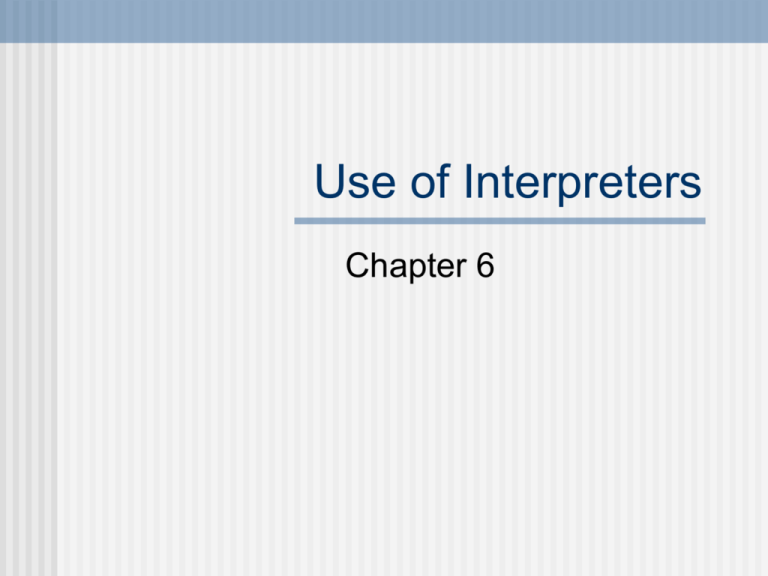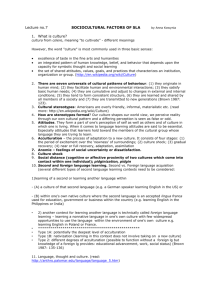Use of Interpreters
advertisement

Use of Interpreters Chapter 6 Definitions Interpreter: conveys information from L1 to L2 orally Translator: conveys information from L1 to L2 in writing. Criteria for Selection of Interpreter Equally fluent in English and the native language Have a minimum of a high school diploma. Be able to: Accurately translate from L1 to L2 Be sensitive to the style of the speaker Adjust to linguistic variations Know about the culture of the speaker Familiar with educational terms Understand their role in the IEP meeting Flexible People who should not be interpreters Friends of the student or his/her family. Family members of the student Possibly the student’s teacher Anyone who is also attending the same school as the student (another student) Anyone who is not fluent in both languages Anyone who cannot be impartial about this child Anyone who does not understand confidentiality issues and the importance of FERPA and test confidentiality. Interpreter Code of Ethics Keep all information strictly confidential. Always convey the content and spirit of the message in a manner understandable by all. Shall not counsel, advice, or interject personal opinions. Only accept assignments for which qualified. Fee information is decided upfront. Be respectful to all persons involved. Shall attend any additional training needed and study current literature of the field. Specific Translator Training that Might be needed. Special education terms in both English and other language (ex. Pg 99-100). Procedures for any meetings for which they are translating. Basic rules for assessments. Basic techniques for assessments. Overview and practice joint administration of tests in the target language. Legal and ethical guidelines needed to work as a translator. Basic knowledge of 2nd language acquisition. Things to teach the interpreter… Know the purpose of the session and any materials needed. Ask questions when you are unclear. Introduce yourself and everyone else Interpret everything (not just the gist) do not make assumptions that this bit of information is unimportant and doesn’t need translating. Remain neutral throughout. Maintain confidentiality throughout. Tips when using interpreters… Allow time before testing to train the interpreters (long before) and reacquaint the interpreters (right before) with tests. Speak in short, simple sentences. Avoid idioms or jargon. Use specific terms. Allow time to translate all messages. Frequently check for understanding. For first one or two times, have someone else sit in who speaks both languages to evaluate. More tips… Speak naturally in brief but complete sentences. Look at the person talking, not the interpreter. Monitor facial expressions for confusion. Monitor body language to judge acceptance of the information. Allow extra time for this type of testing and these types of meetings in your schedule. You administer the tests, not the translator. Allow for breaks when needed. Nothing said should be left out of translation. Group Project: Translator Your administrator has requested that you find a German translator for an pre-referral meeting. Where would you look inside of the school? Where would you look outside of the school? What would you tell your administrator that is needed prior to the meeting? The child needs testing, what would you tell your administrator if needed prior to the assessment? The Interview Process Chapter 7 Benefits of the Interview Firsthand knowledge or developmental, experiential and academic hx Insight into family, culture, and education of the student, teacher, and parent Information about previous interventions attempted prior to referral Description of social (peer, teacher, and family) interactions A chance to tell parents about the assessment process and update them on their rights. Knowledge of child’s day-to-day experiences. Problems with Interviews Interview information is subjective. Interview information is non-normative Interviewees may over (or under) emphasize the problem so that the child will (or won’t) look to need services. Interviewees may leave out information that would be vital (either because you didn’t ask or they didn’t want to tell). Group Project A teacher of a child who has been referred for testing wants to talk to you in the hall. She has additional information about the child she wants to share. The child’s file is on your desk, but you haven’t seen anything beyond the name. What do you do right then in the hall? Look at Form 7.1 in your book and decide what are some things that need doing prior to the interview. Why do you need to do these things? Assumptions before the interview Parent is as or more concerned than you are about the problem. Parent wants to be involved in each step of the process. Parent has information that is critical for an accurate assessment of the child. Parent has already worked to address the problems using some sort of techniques at home. Assumptions when doing any interviews or consultation You are the expert on assessment and diagnosis as well as intervention services. The teacher is an expert on the academic wellbeing of this child, the classroom that the child is in, the peer interactions of this child, and curriculum in general. The parent is an expert on the physical, developmental, and emotional well-being of this child as well as family interactions, thoughts and dreams of the child, and almost any childspecific information. Each of you work together as a team of experts. Structured interview formats Sattler has a great list of structured interview formats. BASC Structured Developmental History is also a great interview format. The text has great interview questions on forms 7.2, 7.3, and 7.4. Structured interviews allow for you to ask most of the relevant questions without missing vital information because you forgot to ask. Problems with Structured Interviews Rapport is slow to develop if you stick to only the scripted questions. Important questions may not be asked because “they aren’t on the form.” Some questions may not be appropriate for certain problems or dx questions, thus you may be taking up valuable time asking meaningless questions. What are the most important questions? Those related to the referral concern. Those that assist in the identification of a disability, area in need of intervention, or better understanding of the system in which the child lives. Questions that help rule out (or in) exclusionary factors as the main problem. Phone interviews? Interviewing by phones is hard to do, but especially difficult when the parent does not speak English. Rapport is slow to build Body language cannot be seen Parent may not be able to give full attention to a phone call. Sometimes, phone interviews are the only way to get any information; however, if a parent cannot get to a school, maybe a home visit is the best way to handle the situation. Acculturational Factors Chapter 8 2004 IDEA Regs. Eligibility team should… “Draw upon information from a variety of sources, including aptitude and achievement tests, parent input, and teacher recommendations, as well as information about the child's physical condition, social or cultural background, and adaptive behavior” 2004 IDEA regs. . . Assessments should be … “selected and administered so as not to be discriminatory on a racial or cultural basis provided and administered in the child's native language or other mode of communication and in the form most likely to yield used for the purposes for which the assessments or measures are valid and reliable administered by trained and knowledgeable personnel” Test bias . . . Test bias: when one group systematically performs differently from another group on an instrument. Early test developers felt that the reason that certain culturally groups did worse on certain tests was due to deficits in the cultural group and not problems with the tests. Test bias relates more to the validity of a test’s scores and not the reliability of the scores. Test is “culturally loaded” test contains culturally specific elements and expects a certain level of acculturation to do well. Validity and Tests “When a child’s general background experiences differ from those of the children on whom a test was standardized, then the use of the norms of that test as an index for evaluation that child’s current performance or for predicting future performances may be inappropriate” (Salvia and Ysseldke, 1991). IQ and culture Scarr (1978): “intelligence tests are not tests of intelligence in some abstract, culture-free way. They are measures of the ability to function intellectually by virtue of knowledge and skills in the culture of which they sample.” Sample here may be the normative sample; however it may also be the items chosen to be administered as well. Acculturation Acculturation: an individual’s process of acquiring cultural knowledge for a new culture. Acculturation is a spectrum not a dichotomy. Acculturation is developmental. A person new to a culture is going to take time to learn and familiarize him/herself with that culture. When comparing scores on a test, one needs to make sure that Ss are matched by age, language, and acculturation NOT just by age and language. Typical Generations First generation (foreign born) Newly arrived: little acculturation or L2 Type 1: several years, BICS only Type 2: speaks L1 outside of work situations, gets by in L2 in work situations 2nd Generation (U.S. born) Preschool: L1= parent’s language. L2 for some T.V. School Age: L2 for BICS, L2 for most T.V., literate in L2 only Adult Type I: @ work speaks L2 @ home L1 Adult Type 2: L2 most of the time, knows L2 better than L1 Typical Generations, Cont. Third Generation (U.S. born) Preschool: Other language and English simultaneously School age: Uses English most of the time (only uses other language when forced). Adult: Uses English most of the time, can understand other language better than speaking it. Fourth Generation (U.S. born) Preschool: Does not understand any language other than English. School age: limited receptive competence to other language than English Adult: Very little receptive language in any language other than English. Almost completely English dominant. Domains of Acculturation Language use/ preference Social affiliation Daily living habits Cultural traditions Communication style Cultural identity/ pride Perceived prejudice/ discrimination Generation status Family socialization Cultural values Goals of Measuring Acculturation Establish the degree to which the individual has (or has not) acquired the level of acculturation that might otherwise be expected for his or her age or grade. Determine the impact that this difference may have on formal, standardized testing. Determine the impact that this difference may have on academic and social/emotional/ behavioral issues for the child. Evaluating Acculturation Interview: Table 8.2 in your book has a list of sample interview questions Interviews may need to be with the parents of young children, but you may be able to interview an adolescent directly. Interviewers need to be culturally sensitive. Observation: Patterns of preference, identification, participation, and afilliation, language use, dress, holidays celebrated, etc. Done across settings and times Evaluating Acculturation: Questionnaire There are formal questionnaires (e.g., BAS and SOMPA) as well as informal questions you write to a parent. Culture on the questionnaire needs to match the culture of the individual. Needs to address acculturation constructs that you want to know about. Need to be reliable and valid Note that acculturation-related terms used by one scale may not be defined the same way on a different scale. Group Project How might you approach choosing an assessment battery (including questions in interviews, questionnaires, etc.) differently for a child who was 2nd generation from Brazil and a child who just arrived from Brazil during that school year?








